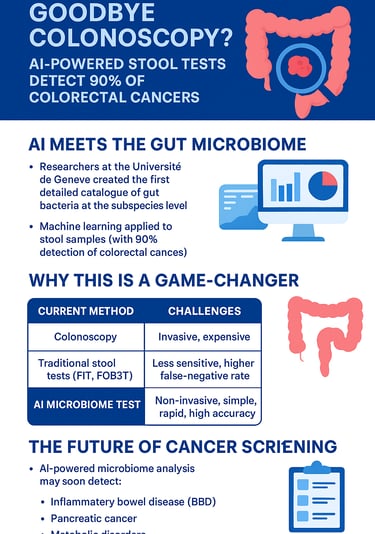Goodbye Colonoscopy? AI-Powered Stool Tests Detect 90% of Colorectal Cancers
Colorectal cancer (CRC) is one of the leading causes of cancer-related deaths worldwide. The gold standard for screening has long been colonoscopy — a highly accurate but invasive, costly, and often dreaded procedure. Now, a groundbreaking study from the University of Geneva is offering hope for a simpler, more accessible alternative: AI-powered stool testing.
9/22/20251 min read


Date: September 17, 2025
Source: Université de Genève
🧠 AI Meets the Gut Microbiome
Researchers at the Université de Genève have built the first comprehensive catalogue of gut bacteria at the subspecies level. Using advanced machine learning algorithms, they analyzed stool samples and discovered unique microbial patterns linked to colorectal cancer.
Key finding:
📊 90% detection rate for colorectal cancers — nearly on par with colonoscopy.
This new test analyzes the gut microbiome — the diverse community of bacteria living in the digestive tract — to identify early markers of disease. The AI system can differentiate between healthy microbiomes, precancerous lesions, and established cancer.
🏥 Why This Is a Game-Changer
Current Method Challenges Colonoscopy Invasive, expensive, requires bowel prep, time off work, anesthesia Traditional Stool Tests (FIT, FOBT) Less sensitive, higher false-negative rates AI Microbiome Test Non-invasive, simple sample collection, rapid results, high accuracy
This means better access to screening, particularly for people who avoid colonoscopies or live in regions with limited access to gastroenterology services.
🔬 Clinical Relevance
Earlier Detection: Catching cancer before it becomes symptomatic dramatically improves survival rates.
Lower Costs: Stool tests can be performed at scale, reducing healthcare expenditure.
Patient Compliance: Easier, less invasive methods increase screening participation.
“This breakthrough could transform the way we detect colorectal cancer, making screening accessible to millions who currently skip colonoscopies.”
— Lead Researcher, Université de Genève, 2025
⚠️ Limitations & Next Steps
While promising, AI-based stool testing is still under clinical validation. Questions remain regarding:
Real-world performance across diverse populations
False-positive rates and follow-up requirements
Integration with existing screening guidelines
Clinical trials are underway to evaluate how this technology compares to colonoscopy over long-term follow-up.
🌍 The Future of Cancer Screening
AI-powered microbiome analysis may soon extend beyond colorectal cancer to detect:
Inflammatory bowel disease (IBD)
Pancreatic cancer
Metabolic disorders
Imagine a future where a simple stool sample becomes a comprehensive health snapshot, identifying multiple diseases at once.
✅ Takeaway
The days of routine colonoscopy for everyone may be numbered. AI-driven stool testing offers a patient-friendly, cost-effective, and highly accurate way to screen for colorectal cancer — potentially saving lives through earlier detection.
